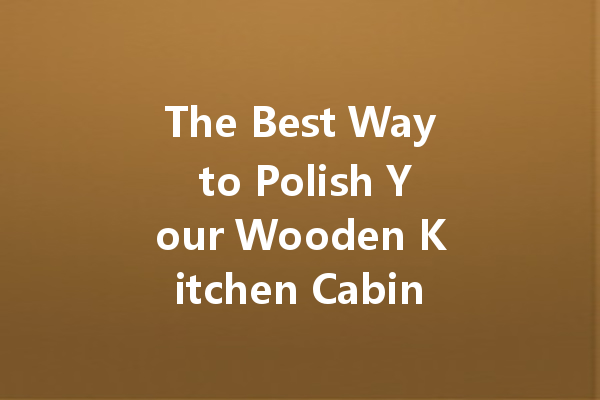Polishing your wooden kitchen cabinets not only enhances their beauty but also extends their lifespan. Over time, cabinets can accumulate dust, grease, and scratches, making them look dull and uninviting. In this article, we’ll explore the best techniques for polishing your wooden kitchen cabinets to keep them looking fresh and radiant.
Why Polishing Your Cabinets is Important
Polishing your cabinets serves several purposes. First, it removes dirt and grime that can accumulate over time, revealing the wood’s natural grain and luster. Second, it provides a protective layer that helps shield the wood from moisture, spills, and wear. Regular polishing can also help prevent deeper scratches and damage, ensuring your cabinets look great for years to come.
Choosing the Right Wood Polish
Before you begin the polishing process, it’s crucial to select the right wood polish for your cabinets. There are various types available, including:
Choose a polish that fits your preferences and the finish of your cabinets. Always test a small, inconspicuous area before applying the polish to the entire surface.
Preparing Your Cabinets
Cleaning the Surface
Before polishing, it’s essential to clean your cabinets thoroughly. Use a soft, damp cloth to remove surface dust and grime. For tougher stains, a mild, non-abrasive dish soap can be used in combination with water. Make sure to dry the cabinets completely to prevent any moisture from being trapped under the polish.
Repairing Scratches
Inspect your cabinets for any scratches or dents. If you find any, use a wood filler or scratch concealment pen that matches the color of your cabinets to repair the damage. Allow it to dry completely before proceeding to the polishing step.
How to Apply the Polish
Step 1: Gather Your Supplies

You’ll need the following supplies:
Step 2: Apply the Polish
Shake the polish bottle well before using. Pour a small amount of polish onto a sponge or cloth, then apply it to a small section of the cabinet. Use circular motions to work the polish into the wood, being careful not to apply too much pressure.
Step 3: Buff the Surface
After applying the polish, use a clean, dry cloth to buff the surface gently. This will help bring out a shine and remove any excess polish. Make sure to work with the grain of the wood to prevent scratches.
Maintaining Your Cabinets After Polishing
To keep your cabinets looking their best, establish a regular cleaning and polishing schedule. Dust your cabinets weekly to prevent buildup, and polish them every few months, or as needed based on their appearance. For high-traffic kitchens, consider polishing more frequently to maintain the finish.
Eco-Friendly Alternatives
If you prefer natural products, you can make your own wood polish using common household items. A mixture of olive oil and vinegar (in a 3:1 ratio) can serve as an effective polish and is safe for the environment. Apply it with a soft cloth, following the same techniques mentioned earlier.
Conclusion
Polishing your wooden kitchen cabinets is a simple yet effective way to enhance their appearance and protect your investment. By choosing the right products, preparing your cabinets properly, and maintaining a regular cleaning routine, you can keep your kitchen looking fresh and inviting for years to come. Happy polishing!
